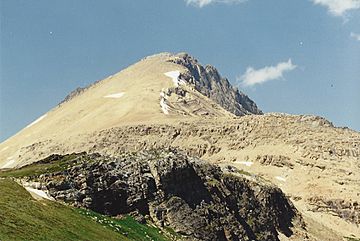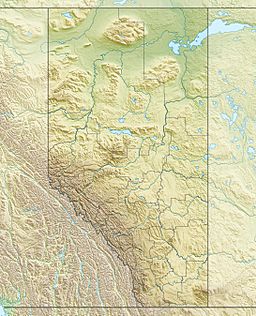Cirque Peak (Alberta) facts for kids
Quick facts for kids Cirque Peak |
|
|---|---|

Cirque Peak from Helen Lake, July 1994
|
|
| Highest point | |
| Elevation | 2,993 m (9,820 ft) |
| Prominence | 341 m (1,119 ft) |
| Parent peak | Observation Peak |
| Listing | Mountains of Alberta |
| Geography | |
| Parent range | Canadian Rockies |
| Topo map | NTS 82N/09 |
| Climbing | |
| First ascent | 1899 |
| Easiest route | Easy Scramble |
Cirque Peak is a tall mountain in the Canadian Rockies. It stands about 2,993 meters (9,820 feet) high. You can find it in Banff National Park in Alberta, Canada. The mountain is located west of Dolomite Pass.
The name "Cirque Peak" comes from its shape. A cirque is a bowl-shaped hollow. This mountain has a natural bowl carved into its side.
Contents
Climbing Cirque Peak
You can climb Cirque Peak using an easy route called a scramble. Scrambling means you use your hands and feet to climb. It is not as hard as rock climbing.
How to Reach the Starting Point
The climbing route starts near Helen Lake. To get there, follow the Helen Lake/Dolomite Pass trail. This trail is about 6 kilometers (3.7 miles) long. You can find the trailhead next to the Icefields Parkway.
The Scrambling Path
Once you reach Helen Lake, continue on the trail into Dolomite Pass. From there, you can choose your path up the peak. It is considered an easy scramble.
What is Cirque Peak Made Of?
Cirque Peak, like other mountains in Banff Park, is made of sedimentary rock. This type of rock forms from layers of sand, mud, and shells. These layers build up over millions of years.
How the Mountain Formed
The rocks in Cirque Peak were laid down a very long time ago. This happened during the Precambrian and Jurassic periods. These periods were between 541 and 145 million years ago. The rocks formed in shallow seas. Later, a big event called the Laramide orogeny happened. This event pushed the rocks east. It lifted them up to create the mountains we see today.
Weather at Cirque Peak
Cirque Peak has a subarctic climate. This means it has very cold and snowy winters. The summers are usually mild.
Winter Conditions
Temperatures can drop very low in winter. They often go below -20 °C (-4 °F). With the wind, it can feel even colder. The wind chill can make it feel like -30 °C (-22 °F) or even colder.
 | Precious Adams |
 | Lauren Anderson |
 | Janet Collins |


